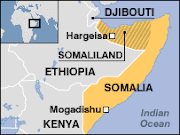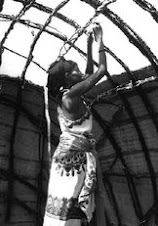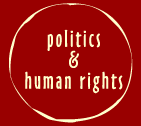Sunday, November 16, 2014
Wadani Party Press Release: THE RRU TAKES OVER THE SOMALILAND PARLIAMENT (14 Nov. 2015)
Monday, October 6, 2014
Hargeisa City Living and the Traffic Jams
Saturday, September 13, 2014
Ali Khalif’s Disguised Politics of “Somali Unity” A dangerous message
“sacred Somali Unity”, with all these colorful, carefully delivered messages, focusing his talking points, they sure will feel sympathy for the guy. The drama generates temporary pity, and that is what he is aiming for, to get empathy, however misguided.
Sunday, September 1, 2013
The ineffectiveness of the House of Guurti and its dire consequences for Somaliland's political future
Sunday, May 16, 2010
Hargeisa: a capital in search of a country, by Sean McLachlan

Wednesday, March 3, 2010
Dacwadda Cali Samatar iyo Saamaynta ay Somalida ku leedahay
 Fikirka Xorta ah - Muddo badan ayaa dacwad ka dhan ah Sarreeye Gaas Maxamed Cali Samatar oo sita darajada ugu sarreysa ciidanka Somaliya, in badana ahaa Madaxweyne Xigeen iyo Wasiirka Gaashaan Dhigga ugu dambayntiina hayay jago Ra'iisal Wasaare ayaa waxay muddo lix sano ah ka socotay dalka Maraykanka.
Fikirka Xorta ah - Muddo badan ayaa dacwad ka dhan ah Sarreeye Gaas Maxamed Cali Samatar oo sita darajada ugu sarreysa ciidanka Somaliya, in badana ahaa Madaxweyne Xigeen iyo Wasiirka Gaashaan Dhigga ugu dambayntiina hayay jago Ra'iisal Wasaare ayaa waxay muddo lix sano ah ka socotay dalka Maraykanka.Nuxurka dacwadda ayaa waxay tahay mid ay shakhsiyaad ka soo jeeda Somaliland oo ama dadkoodii la laayay ama ay iyaga dhibaato gaar ahi ka soo gaadhay ay maxkamaddaha dalka USA oo cid kasta u furan ay ka codsadeen in magdhaw Cali Samatar lagu xukumo dhibka ay sheeganayaan daraaddeed.
Dhawrkan qof ee dacwadda soo oogay oo kaashanaya hayad madax bannaan oo qareenno u dooda dadka jidh dilka dalkoodii loogu soo geystay oo loo yaqaan Center for Justice and Accountability ayaa waxa maxkamadda hoose ee Magaalada Washington DC. ee Caasimadda Maraykanka hordhigeen dacwaddaas sanadkii 2004.
Dacwaddan ayaa maxkamaddu waxay saartay hakin laba sanadood ah si bal ay u hubiso in Sarkaal Sare oo magaca dalkiisa ku fuliyay ficilo ka dhan ah xuquuqda aadanaha maxkamadaha dalka USA ay awood u leeyihiin inay dhegeystaan, go'aanna ka gaadhaan iyo in kale. Waxa kale oo ay maxkamada hoose ee DC. ka codsatay in ay Wasaaradda Arrimaha Dibadda ee dalka USA soo dhexgasho oo ay talo ka siiso, mar haddii ay wasaaraddaasi tahay mid danta dalkooda ka shaqaysa.
Sanadkii 2006 ayaa maxkamadda hoose ee DC. laashay kiiskii lagu soo oogay Cali Samatar iyadoo sabab uga dhigtay go'aankeeda qodobada doodda ah ee qareenada Cali Samatar oo iyagu ku andacooday in xeerka FSIA (Foreign Sovereign Immunity Act of 1976) qorayo in aan sarkaal dal kale hawshiisa fulinayay aan maxkamad la soo taagi karin.
Kooxda ashkatada wadda ayaa iyagu markiiba rafcaanka qaatay oo maxkamadda rafcaanka ka codsaday in kiiskooda la dhegeysto. Sababtoo ah waxay sheegeen in sharciga kiiskooda lagu tuuray aanu khusayn Cali Samatar isla markaana sharci kale oo dheeraad ah oo loo yaqaan Torture Victims Protection ACT uu yahay ka la tiigsanayaan.
Qareenada Cali Samatar ayaa waxay markiiba rafcaan ka qaateen xukunkaas. Waxanay Maxkamadda Sare ee dalka Maraykanka (US Supreme Court) oggolaatay inay dhegaysato kiiskan. Haddaba dacwaddani waxay anfariir ku ridday dawlado badan oo shisheeye oo ka cabsi qaba in madaxdooda hadhow maxkamad lagu soo taago dalka USA. Waxanay dalalkaasi bilaabeen inay qareenno badan maxkamadda u qabsadaan oo qoraallo kiiska lagaga soo horjeedo ku qarqiyaan Maxkamadda Sare.
Dalalkaas waxa ka mid ah Boqortooyada Sacuudi Carabiya, haydaha Jewish ka ama Yuhuudda ah ee danta Isreal ka shaqeeya, iyo madax hore oo dalka Maraykanka ka soo shaqayn jirtay isla markaana ka cabsi qaba in iyaga sidan oo kale loo dacweeyo.
Maxkamadda oo Maalinta Arbacada ee Bisha March 3, 2010 lagu dhegeystay xarunta Maxkamadda Sare ee dalka USA ee Magaalada Washington DC. ayaa waxa ay Somalida deggan dalka Maraykanku toddobaadyadii la soo dhaafay oo dhan ay wadeen shirar xoolo uruurin iyo taageero ah oo ay kaga soo horjeedaan kiiska Cali Samatar. (Halkan ka akhri transcript ka maxkamadda)
Waxa Gobolka Minnesota ka dhacay toddobaadkii la soo dhaafay xaflad aad u ballaadhan oo ay ka soo qaybgaleen dad badan oo gobolkaas deggen. Waxana dadkii halkaa ka hadlay ee Cali Samatar taageerayay ka mid ahaa Saado Cali Warsame oo aad ugu dheeraatay sida ay uga soo horjeeddo. Daawo Sawirada.
Waxa kale oo shir lagu qabtay Magaalada Columbus ee Gobolka Ohio oo sidoo kale si culus loo taageeray dacwadda Cali Samatar. Daawo Sawirada.
Maxkamadda Sare ayaa la filayaa inay toddobaadyo ama bilo ay ku qaadato inay go'aan ka gaadho su'aasha hortaalla ee ah in "Shakhsi Madax Sare ka soo ahaan jiray Dal kale maxkamad lagu soo taagi karo dalka USA marka uu xilka ka dego muddo ka dib iyo in kale"
Haddii ay Maxkamadda Sare ee USA ku jawaabto haa waa la dacweyn karaa waxay noqonaysaa mid qoto dheeraata Somalida hadda qolooyinka u kala jabsan ee Somaliland iyo Somaliya u kala fadhida ay marka kiiska la bilaabo ee gudaha loo galo wixii dhib la geystay iyo dadkii la laayay murankoodu sii xoogaysto. Isla markaana ficiltan xoog leh geli doona.
Sidoo kale haddii ay Maxkamadda Sare go'aankeeda aqbalaadda ahi wuxuu cabsi ku abuurayaa dalal badan oo madaxdoodu geysato jidh dil iyo xad gudub xuquuqda aadanaha. Waana ta ay ka dagaalamayaan.
Haddii ayse Maxkamadda Sare ee USA diiddo oo ku go'aansato in aan cid dal kale madax ka ahaan jirtay dalka USA maxkamad lagu soo taagi karin. Taasi waxay niyad jab ku tahay hayadaha faraha badan ee u dooda xuquuqda aadanaha oo si weyn iyaguna u sugaya kiiska Cali Samatar oo la filayo inuu noqdo dariiq ay kaga hortagaan waxyaabaha ay u arkaan jidhdilka iyo tacadiga adduunka dacaladiisa ka dhaca.
Dacwaddan oo kooxo kala duwani taageerayaan, ayaa sidoo kale dawladdii Cabdillahi Yusuf ee Embagathi iyo Ta Sheekh Sharif ba warqad ay ku taageerayaan u qoreen Cali Samatar oo ay Dawladda Maraykanka kaga codsanayaan in dacwadda la tuuro. Hase yeeshee Dalka USA oo aan aqoon sanayn cid Somali metesha dawladdii Siyaad Barre dabeed ayaa diiday inay soo dhex gasho arrintan. Waxa isaguna qoraal ka dhan ah Cali Samatar isla markaana lagu taageerayo dadka dacweynaya soo qoray Wasiirka Arrimaha Dibadda ee Somaliland Cabdillahi Maxamed Ducaale.
Cali Samatar iyo shakhsi kasta oo dalka Maraykanka deggani waxay xaq u leeyihiin in haddii la soo dacweeyo ay is difaaci karaan. Isla markaana weydiisan kara in lagu soo caddeeyo wixii loo haysto. Midda kale dacwaddina maaha mid criminal ah ee waa mid civil ah ama medeni ah oo magdhaw keliya la rabo isla markaana haddii lagu helo aanu Sareeye Gaas Cali Samatar aanu xabsi ku geli karin.
Su'aasha meesha taallaa, Somali inteeda kale ee deggan dalka Maraykanka marka laga reebo reer Somaliland, waa maxay sababta ay Cali Samatar u taageerayaan hadduu xaq u leeyahay inuu isdifaaco oo aan cidla laga helin? Colaadda gaarka ah ee qudbadaha shirarka qaarkood ka muuqataa miyaanay ahayn mid dadka sii kala fogaynaysa? Haddiise aan ciddii hore wax u geysatay sharciga lala tiigsan, miyay joogsanaysaa dhagarta laga gelayo shacbi aan waxba galabsan?
Cali Samatar waa madaxa ugu sarreeya ee dawlad adduunku u aqoonsanyahay in ay dhib dad shacbi ah u geysatay waana mid habboon in lagula xisaabtamo. Ma habboona in qabiil loo rogo, ciddii ka cabsi qabta in iyagana waddo ku furanto ha iska difaacaan haddii ay dembi hore u galeen. Haddiise aanu qofna waxba galabsan, wuxuu u cabsadaa waa gardarro.
Halkan ka daawo warbixinta Barnaamijka 20/20 ee ABC Television
Friday, January 8, 2010
"La Somalie entre chaos et espoir",
 The International Crisis Group published this article about the Plight of Somalia in French.
The International Crisis Group published this article about the Plight of Somalia in French.Please click here to read the original French language article.
Below is web based translation of the article in English.
Conflict destroys the Somalia for nineteen years gives all signs of entering a new stage more desperate for the population, more complicated on the political and more dangerous plan for the world.
Meteoric growth in the number of pirate attacks off the coast of this martyr country resulted in a mobilisation of maritime resources important to try to curb the phenomenon.
Yet, this is on land that is is played on more than two decades the destruction of a country with some survivors have found in piracy an unhoped-for way out of poverty.
While the national reconciliation process raised a certain hope at the beginning of 2009, the escalation of violence in the capital and in the South of the country might destroy modest advanced over the last few months. Without vigorous and concerted outside actors intervention, the brutal disintegration of the country speed:
the fighting continue cause floods of displaced persons and provide a conducive to radical Islamist groups recruiters compost.
Advertising
Today, the Transitional Government is lower than ever. It controls only a few districts of Mogadishu. Elsewhere, the army and Islamic factions clash to sit their power. Since the dissolution of their alliance, fighting resumed between two radical groups Al-Shabaab and Hizb al-Islam. Al-Shabaab, ever more closely linked to international djihadisme dominates most of southern cities.
The humanitarian situation exceeds the imaginable. Close to half of the population, or 3.6 million people, is dependent on food aid. Nearly a half million refugees have fled to neighbouring countries and more than 1.3 million displaced internal legacy in camps around Mogadishu. The prolonged drought and threats against humanitarian personnel contributed to produce one of the greatest humanitarian disasters in the world.
Al-Qaida fighters some come from Pakistan saw fair: anarchy and misery, the political polarization attisée by ideological differences are an ideal field of action for them.
The abyssal situation is the result of a series of political failures and missed opportunities. At the beginning of the year, the conflict resolution process seemed finally draw.
The "process of Djibouti" was, under the aegis of the United Nations, allow the rallying to moderate insurrectionnels movements transitional Government and to isolate the radical groups.
Under pressure from the United Nations, African Union, the European Union and the United States, Sheik Sharif, a former insurgent rallié process of Djibouti, was appointed President of the Transitional Government. It seemed fair to expect to rally to its cause groups until then opposed to the reconciliation process.
But Sharif went to negotiations without will have the means to offer real benefits to the insurgents in exchange for their rallying. Consensus candidate, Sharif quickly rose to the status of traitor in the eyes of these groups. The Government is now lower than ever: acculé in Mogadishu, must its survival in support of international forces.
Yet the United States and Ethiopia blocked negotiations with major figures of the rebellion, they see as Islamist terrorists. In hesitating to engage politically with the insurgents, the United Nations have, too, failed to play their role as mediator.
Today, Sharif agreed with those who consider that armed intervention is the only alternative after the failure of the Djibouti process. Taken in the preparation of a massive offensive against the insurgents, it can no longer be Ombudsman figure.
Yet the insurgency is more divided than ever and its more radical faction, Al-Shabaab, is subject to growing political pressure. The brutal elimination of political dissidents and the uncompromising application of Sharia law have made it unpopular in the eyes of the population.
When challenge to restart on an acceptable basis for the majorité of the Somali peace process. Mediators must be nominated and it is imperative to resume language with the insurgents. Somalia has unfortunately defied since good more aguerries mediating will chandeliers...
The challenge of the moment is to create a negotiation process leads and appropriate by the Somalis. A process that can gather around its settings a broad consensus and where a large number of insurgents groups would find his account. A process that would see Eritrea and Ethiopia cease to inflame the conflict and the United States, blinded by their fear of terrorism, halt their deliveries of weapons.
The danger of having the endless Somali conflict eventually destabilize its neighbours is more real than ever. Piracy and its rocambolesques episodes occupy our screens at point blank hundreds of thousands of refugees in Kenya and internal displaced millions.
Avoid as the descendants of these damned of the earth do meet the sirens of extremism should motivate the countries of the region, the great powers and UN, REList with courage and perseverance the book on the business and again undertake the hard work of renew son tenuous dialogue, there where everything appears as lint and tatters.
Alain Délétroz is vice-president (Europe) of the international Crisis Group.
The time
Monday, November 30, 2009
Somaliland: Somaliland Rejects Somali President’s Remarks
 I have expressed my discontent on how Somali so called President Sh. Sharif has reacted to the question on Somaliland. He basically told BBC Somali Service that "shit happens" and Somaliland people should get over the pain and suffering as all Somalis in Somalia proper faced the same faith.
I have expressed my discontent on how Somali so called President Sh. Sharif has reacted to the question on Somaliland. He basically told BBC Somali Service that "shit happens" and Somaliland people should get over the pain and suffering as all Somalis in Somalia proper faced the same faith.
Prior to that news, Sharif was reported calling General Ali Samatar, a notorious deputy President of Somalia for 20 plus years to offer his help to fight against war crimes charges.
Gen. Samatar ordered the destruction of the former "northern" cities of Somalia, current Somaliland Capital City of Hargeisa and second largest city of Burao.
Gen. Samatar admitted given the order to bombard and annihilate without regard to human lives. Human rights organization, Amnesty International, estimated the death of civilians over 50, 000.
Gen. Smatar is awaiting a civil trial in the US. Several survivors are suing him of wrong doing. He has appealed to the Supreme Court to stop the trial and waiting the results. Sh. Sharif who calls himself a president phoned Gen. Samatar and promised him his help to stop the trial.
The unsophisticated Sharif is getting himself into this complex issue of what had happened in the past. However, one thing is very clear, current and former Somali politicians don’t want to create a climate of accountability. None of them wants to find out what had happened? Who did what? Who should be the person responsible? and how to prevent this in the future?
Meanwhile, Somaliland government reacted to his remarks –
Click here to read their response.
Thursday, November 26, 2009
The legal context of the missing Somalis case
Click here to listen the legal context.
A Somali man is implicated the missing men departure to fight in a foreign country.
Click here to read the article -









